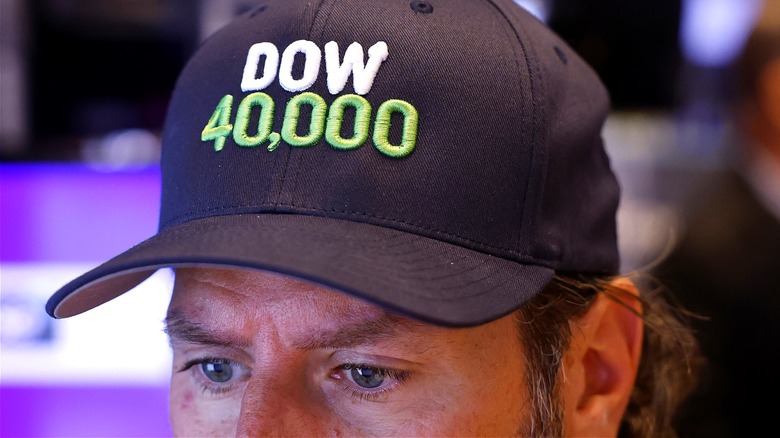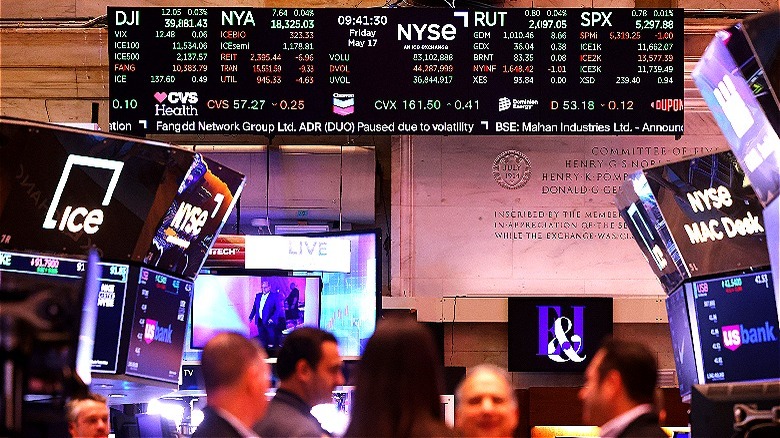Dow 40,000: Why A Booming Stock Market Might Actually Be Bad For You
On May 16, 2024, the Dow Jones Industrial Average accomplished what few investors would've thought possible as recently as a few years ago: It broke the 40,000 threshold. Anticlimactically, the benchmark stock market index was unable to hold that level into the market close. The reason for the rally that propelled stocks into a short-lived euphoria that day was a slightly weaker-than-expected Consumer Price Inflation report — the first benign inflation reading in several months.
The rationale being that cooling inflation will provide the Federal Reserve with an opening to start lowering its federal funds rate, possibly as early as September 2024. For reference, the federal funds rate has increased from near-zero to 5.25%-5.50% since early 2022 in an attempt to halt inflation in the United States (and achieve a soft landing for the economy). Many investors view the anticipated series of rate cuts as a stepping stone to the next leg up in the economy. That is, lower interest rates provide increased purchasing and borrowing power to all consumers, but especially for high-ticket items like cars and homes.
However, there's a certain irony to the fact that equities investors are salivating over rate cuts at the same time that all major stock market indexes are at or near all-time highs. The optics of the Federal Reserve cutting rates at all-time highs are dodgy, at best. Typically, the federal funds rate is reduced when an economy appears to be weakening or headed toward recession. However, impeding lower interest rates isn't the only reason why a booming stock market is a double-edge sword.
Booming markets create a wealth effect
A 2023 Gallup poll on stock ownership found that 61% of Americans own stocks. For many, those investments are held in a retirement account like a 401(k) or IRA (find out if a 401(k) or IRA is right for you). There's no doubt that this subset of the United States population is ready to pop open some champagne after checking their investment account balances, which are likely bursting today at the seams. (By the way, here's how often you should check your retirement account.)
Yet, an undesirable byproduct of those lofty 401(k) balances is what's known as the wealth effect. The wealth effect is an economic theory that people spend more as the value of their assets increase. For example, if your investment portfolio is rapidly rising in value, you'll feel richer, even though your employment income and fixed costs like housing haven't changed at all. This feeling of wealth can lead to increased spending, which can lead to common financial mistakes, like not building an emergency fund. In the extreme, this frivolous splurging can even drive some consumers into expensive credit card debt, which carries outrageously high interest rates of 25% or more.
This wealth-effect spending isn't only bad for the individuals doing it, but collectively, it can also contribute to keeping inflation levels high because of increased demand for goods and services. That means that the nearly 40% of Americans who aren't participating in the booming stock market will be subject to the inflation and subsequently higher interest rates perpetuated by those who are.
Irrational exuberance makes a comeback
The Dow hitting 40,000 represents an eye-popping 40% gain since October 2022, which has some financial experts questioning whether irrational exuberance is once again in play. For the uninitiated, irrational exuberance is a term popularized by former Federal Reserve chair Alan Greenspan with regard to the dot-com bubble forming during the late-1990s. It basically refers to behavior that occurs when investor enthusiasm and optimism propels asset prices higher than is justified by fundamentals.
Lately, the stock-market rally has been focused on opportunities stemming from AI, plus healthy corporate earnings and the unwavering confidence that the Fed will ease monetary policy via rate cuts later this year. Heck, even meme stocks like Gamestop (NYSE: GME) and AMC (NYSE: AMC) made short-lived comebacks. However, bad news like slowing retail sales and a Federal Reserve that's increasingly vocal about tempering rate-cut expectations has largely been ignored.
If you're one of the many whose 401(k) balance has some extra zeros added versus a few years ago, by all means, congratulations are in order. However, do keep in mind that many experts, including JP Morgan Chase CEO Jamie Dimon, are cautious about currently stretched stock valuations, along with a possible correction. With this said, while a healthy stock market correction might hurt investors in the short term, it could benefit the whole of society by relieving inflation and the higher interest rates that plague the everyday life of the middle class.


